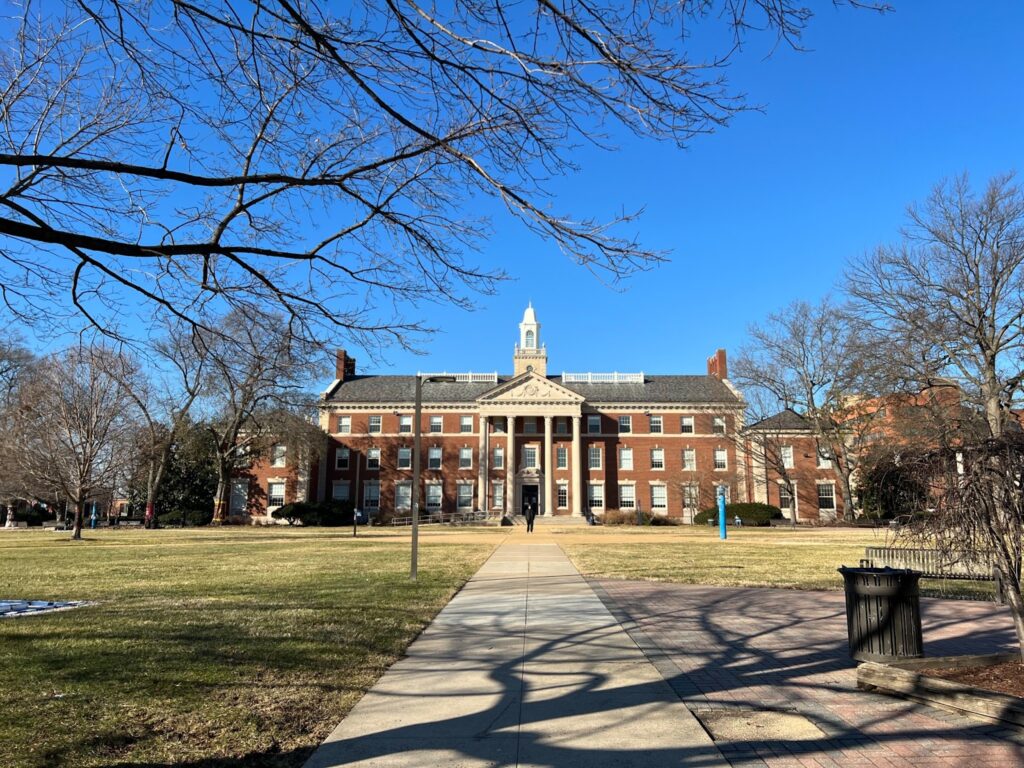
Between congressional promises of more funding, powerful alumni and recent extremist threats, HBCUs around the country have experienced an increase in national attention. Barring that in mind, Senate Democrats chose Howard University as their venue, conducting their all-day conference inside of the newly renovated Douglass Hall.
Unlike the House Democrats retreat, which offers plenty of coverage, the Senate’s low-profile annual retreats bar the press from both the interior and exterior of the building in an effort to thoroughly focus on the issues at hand. With no students on campus due to the university’s closure for spring break, Senate Democrats were able to conduct their business with little to no interruption.
According to White House press secretary Jen Psaki, President Joe Biden made an evening appearance at the conference on Wednesday, then spoke to Democratic National Committee members at their Thursday meeting before traveling to Philadelphia on Friday to address House Democrats at their caucus retreat.
Howard hosting the retreat is no coincidence, as its high profile status and close proximity to the White House make it an ideal location to continue the focus on HBCUs and reflect on the progress the administration has made since promising more funding to HBCUs early last year. Coupled with the recent historic nomination of Judge Ketanji Brown, the decision is a symbol that Democrats are giving attention to Black voters.
Democrat Sen. Chris Coons of Delaware serves as a co-chair for the HBCU caucus, and gave his thoughts about the retreat location in a statement to Roll Call.
“…Howard University is a cornerstone institution in our nation’s capital, with alumni who span business leaders, the Vice President of the United States, and members of my own team,” Coons said. “The university will be an excellent reminder throughout Wednesday’s retreat of the need to reinvest in institutions that open doors for those who have been historically excluded, as well to take steps to address the repeated threats of violence HBCUs have faced in recent months.”
This increased national attention on HBCUs does not come without action. A White House briefing room fact sheet reports that since January 2021, the Biden-Harris administration has made a cumulative $5.8 billion investment in support of HBCUs, the largest of any presidential administration. The number includes three components: the American Rescue Plan, grant funding and debt relief.
Biden’s American Rescue Plan and other pandemic relief provided over $2.7 billion in funding to HBCUs in 2021. The emergency grants from the Department of Education were funded directly to HBCUs. Allegedly, they have helped “students mitigate the negative impact of the pandemic on students’ educational attainment..helped institutions support students’ ability to meet basic needs; target resources to students with the greatest need; support campus operations, staffing, teaching and educational programs; and keep campus communities safe by preventing and mitigating the spread of COVID-19,” the fact sheet reports.
In July and August of 2021, the Department of Education awarded more than $500 million in grant funding to HBCUs for “academic-capacity building and fiscal stability.”
The Department of Education also discharged approximately $1.6 billion of debt from loans provided to HBCUs for “capital improvements… to focus on resources on supporting students, faculty and staff while recovering from the pandemic” through the HBCU Capital Financing Program. This resulted in debt relief to 45 HBCUs –13 public and 32 private institutions – not including Howard.
However, this HBCU debt relief is not the same as what was once promised by Howard alumna and Vice President Kamala Harris. During the Biden-Harris campaign trail, Harris claimed that the Biden-Harris administration would make college tuition free at public and private HBCUs for students whose families’ income is below $125,000 a year and pledged student-loan debt forgiveness for some HBCU graduates.
“In relation to the history of HBCUs, [students] decide to take on a profession of service, which often does not pay as well as if they go into the private sector and do other things,” Harris said at a discussion at Florida Memorial University, a historically Black private institution. “So for those students who come out and have jobs that pay less than $125,000, student-loan debt will also be forgiven.”
Empty fulfillments such as these are what lead people like sophomore political science major Tamia Thompson, 19, to believe that the chosen venue was calculated.
“To me, it is interesting that they chose Howard given the many other Universities in DC, and I do feel like that decision may have been at least a bit influenced by Kamala Harris being a Howard alum. It does feel performative, especially given how President Biden promised to forgive student loan debt for HBCU graduates which he has yet to deliver on, as well as the way that HBCUs nationwide remain underfunded compared to PWIs.”
Freshman political science major Caleb Brantley, 19, offers a different perspective on the situation.
“Many would argue against its performative nature but I contest that his visitation brought a sense of at least wanting to care about the issues that HBCUs face, as well as the funding that has been forgone and denied for years. It was heartwarming to hear about the Biden administration’s $2.7 billion in funding for HBCUs. It shows that we’re trying to move in the right step to support Black minds.”
While the views on the location of the retreat are mixed, there seems to be a larger central theme that the students asked could agree upon, “…the Biden administration still needs to make an effort on a yearly basis to assess the distribution of funds so that every HBCU can have the resources to support its students. Until this happens, we should push the Biden administration at every step,” Brantley finished.
Copy Edited by Jeresa Anderson

